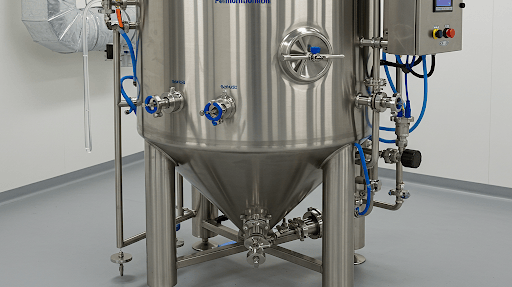Reducing Fermentation Costs by Retrofitting Brewery Vessels: Nosh Bio's Innovations
SUSTAINABILITYALTERNATIVE PROTEINSMOST POPULAR


This is an AI generated illustration and does not represent actual product or service.
The fermentation industry is booming, driven by demand for sustainable proteins, alternative foods, and bioproducts. However, scaling fermentation capacity remains costly, with traditional bioreactors requiring massive capital investments. German startup Nosh Bio has filed a patent (WO2025099104A1) that could revolutionize the industry by repurposing brewery equipment for filamentous fungi fermentation—slashing costs and accelerating scalability.
The Core Innovation: Retrofitting Brewery Vessels
Nosh Bio’s patent outlines a method to convert standard brewery tanks (e.g., fermenters, mash tuns, and yeast propagators) into low-cost bioreactors for growing filamentous fungi like Aspergillus or Fusarium. Key modifications include:
Aeration Systems:
Installing oxygen-injection systems (e.g., air spargers, two-fluid nozzles) to maintain dissolved oxygen (DO) levels at 15–100% saturation, critical for aerobic fungal growth.
Loop systems or porous piping ensure efficient gas distribution without high-energy agitation.
Mixing Solutions:
Jet mixers or magnetically coupled impellers replace traditional stirrers, reducing shear stress on fungal mycelia.
External pumps minimize vessel stress, leveraging breweries’ existing plumbing.
Heat Management:
Cooling jackets or external heat exchangers repurpose brewery chillers to dissipate metabolic heat.
Energy-efficient recirculation loops cut cooling costs.
Harvesting & Downstream Processing:
Filter presses or belt filters (common in breweries) enable low-shear fungal biomass recovery.
Integrated pasteurization and drying systems reuse brewery boilers and kilns.
Cost-Saving Advantages
By retrofitting instead of building new facilities, Nosh Bio’s approach offers:
~50–70% lower CAPEX vs. greenfield bioreactor farms.
Faster deployment: Existing breweries are globally abundant, with infrastructure ready for adaptation.
Circular economy benefits: Spent grains and yeast from beer production can be reused as fungal feedstock.
Market Impact
This patent positions Nosh Bio to disrupt the $1.3B precision fermentation market by:
Enabling small-scale, distributed production (e.g., local breweries becoming “micro-factories”).
Supporting affordable mycelium-based meats, enzymes, and proteins.
Challenges & Next Steps
While promising, retrofitting requires validation at scale. Nosh Bio must address:
Contamination risks in open-top vessels.
Regulatory hurdles for food-grade mycelium production in non-sterile environments.
Overall, Nosh Bio’s patent is a game-changer for sustainable fermentation, turning idle brewery assets into low-cost bioreactors. If scaled, this could democratize access to fermentation tech—making alt-proteins and bio-materials cheaper and faster to produce.




